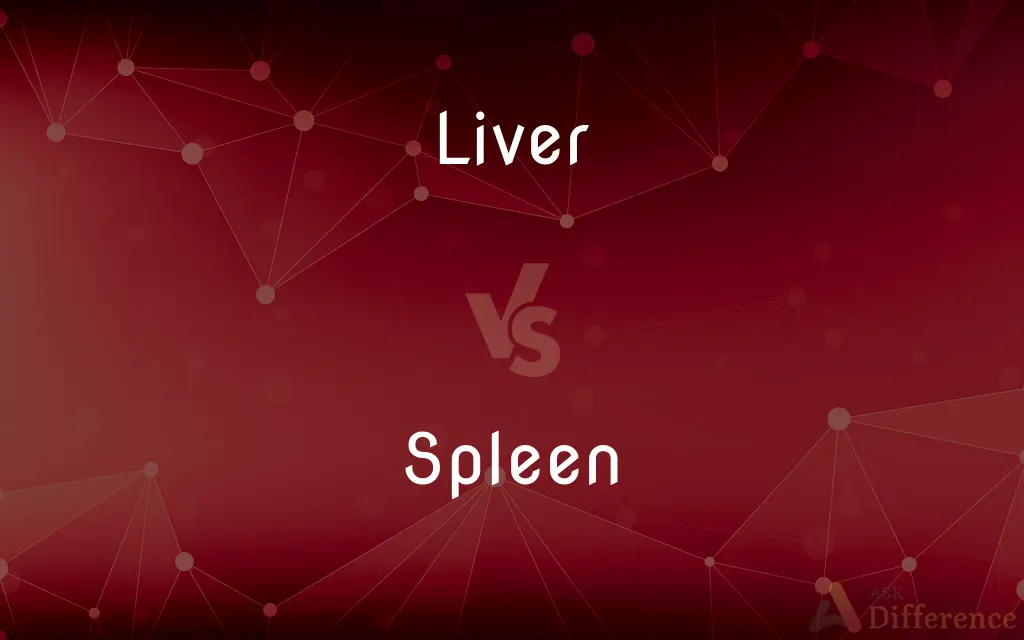Liver vs. Spleen — What's the Difference?
Edited by Tayyaba Rehman — By Fiza Rafique — Updated on April 16, 2024
Liver, a large glandular organ crucial for detoxification and metabolism, contrasts with the spleen, which filters blood and manages immune responses.

Difference Between Liver and Spleen
Table of Contents
ADVERTISEMENT
Key Differences
The liver is a vital organ primarily responsible for metabolism, detoxification, and protein synthesis, playing a central role in managing biochemical processes. On the other hand, the spleen primarily functions as a blood filter and a significant site of immune surveillance and response, concentrating on blood and lymph node functions.
While the liver processes nutrients absorbed from the diet, converting them into essential blood components, stores vitamins, and regulates blood clotting, the spleen focuses on filtering old and damaged red blood cells and helps in the production and storage of white blood cells and platelets.
The liver is unique in its ability to regenerate itself, which is essential for recovery from damage due to disease or surgical removal. In contrast, the spleen does not regenerate, and its removal (splenectomy) can permanently affect the body's ability to fight infections and process old blood cells.
Moreover, the liver produces bile, a crucial digestive fluid essential for breaking down fats in the small intestine. Whereas the spleen has no role in digestion but is involved in the response to certain bacteria by producing antibodies in its white pulp.
The liver is located in the upper right quadrant of the abdomen, immediately below the diaphragm and to the right of the stomach, making it largely protected by the rib cage. Conversely, the spleen is located in the upper left quadrant of the abdomen, also protected by the rib cage but is generally smaller and less shielded than the liver.
ADVERTISEMENT
Comparison Chart
Primary Function
Metabolism, detoxification, bile production
Filtering blood, immune response
Regenerative Ability
Can regenerate after injury
Does not regenerate
Role in Digestion
Produces bile for fat digestion
No direct role in digestion
Location in Body
Upper right abdomen below the diaphragm
Upper left abdomen
Protection by Rib Cage
Largely protected
Less protected, smaller in size
Compare with Definitions
Liver
The liver is a large vital organ involved in metabolic processes.
The liver detoxifies harmful substances from the body.
Spleen
The spleen is an organ involved in filtering blood and immune system functions.
The spleen helps filter out old red blood cells.
Liver
It plays a key role in producing bile, which is essential for digestion.
A healthy liver is crucial for efficient fat digestion.
Spleen
It stores white blood cells and helps in fighting infection.
The spleen activates its stored white cells when an infection is detected.
Liver
The liver acts as a blood filter, regulating its composition.
The liver filters out toxins and produces vital proteins for blood clotting.
Spleen
It responds to blood-borne antigens by producing antibodies.
The spleen’s response to bacteria helps prevent blood infections.
Liver
Known for its ability to regenerate, the liver can recover even after significant damage.
After partial surgical removal, the liver can regrow to its full size.
Spleen
Although smaller than the liver, the spleen is vital for blood quality.
A healthy spleen is crucial for maintaining good blood health.
Liver
It stores excess nutrients and releases them when needed.
The liver stores vitamins and minerals, releasing them as the body requires.
Spleen
The spleen can be removed if damaged, unlike many other vital organs.
Splenectomy may be necessary in cases of severe spleen injury.
Liver
The liver is an organ only found in vertebrates which detoxifies various metabolites, synthesizes proteins and produces biochemicals necessary for digestion and growth. In humans, it is located in the right upper quadrant of the abdomen, below the diaphragm.
Spleen
The spleen is an organ found in all vertebrates. Similar in structure to a large lymph node, it acts primarily as a blood filter.
Liver
A large, reddish-brown, glandular organ in the abdominal cavity of vertebrates that secretes bile and is active in the formation of certain blood proteins and in the metabolism of carbohydrates, fats, and proteins.
Spleen
A large, highly vascular lymphoid organ, located in the human body to the left of the stomach below the diaphragm, that serves as a reservoir for blood, destroys old red blood cells, and contains lymphocytes that combat blood-borne antigens.
Liver
An organ in invertebrates that is similar to the vertebrate liver.
Spleen
A homologous organ or tissue in other vertebrates.
Liver
The bile-secreting organ of certain animals, used as food.
Spleen
(Obsolete) This organ conceived as the seat of emotions or passions.
Liver
A dark reddish brown.
Spleen
Ill temper
Vent one's spleen.
Liver
One who lives in a specified manner
A high liver.
Spleen
(Archaic) Melancholy.
Liver
Made of or flavored with liver:liver pâté.
Spleen
(Obsolete) A whim; a caprice.
Liver
Of a dark reddish brown.
Spleen
In vertebrates, including humans, a ductless vascular gland, located in the left upper abdomen near the stomach, which destroys old red blood cells, removes debris from the bloodstream, acts as a reservoir of blood, and produces lymphocytes.
Liver
(anatomy) A large organ in the body that stores and metabolizes nutrients, destroys toxins and produces bile. It is responsible for thousands of biochemical reactions.
Spleen
A bad mood; spitefulness.
Liver
This organ, as taken from animals used as food.
I'd like some goose liver pate.
You could fry up some chicken livers for a tasty treat. — Nah, I don't like chicken liver.
Spleen
A sudden motion or action; a fit; a freak; a whim.
Liver
A dark brown colour, tinted with red and gray, like the colour of liver.
Spleen
(obsolete) Melancholy; hypochondriacal affections.
Liver
Any of various chemical compounds—particularly sulfides—thought to resemble livers in color.
He gave his horse some liver of antimony.
Spleen
A fit of immoderate laughter or merriment.
Liver
Someone who lives (usually in a specified way).
Spleen
To dislike.
Liver
Of the colour of liver (dark brown, tinted with red and gray).
Spleen
To annoy or irritate.
Liver
One who, or that which, lives.
And try if life be worth the liver's care.
Spleen
(ambitransitive) To complain; to rail; to vent one's spleen.
Liver
A resident; a dweller; as, a liver in Brooklyn.
Spleen
To remove the spleen, or, by extension, to gore.
Liver
One whose course of life has some marked characteristic (expressed by an adjective); as, a free liver.
Spleen
To excise or remove.
Liver
A very large glandular and vascular organ in the visceral cavity of all vertebrates.
Spleen
A peculiar glandlike but ductless organ found near the stomach or intestine of most vertebrates and connected with the vascular system; the milt. Its exact function in not known.
Liver
The glossy ibis (Ibis falcinellus); - said to have given its name to the city of Liverpool.
Spleen
Anger; latent spite; ill humor; malice; as, to vent one's spleen.
In noble minds some dregs remain,Not yet purged off, of spleen and sour disdain.
Liver
Large and complicated reddish-brown glandular organ located in the upper right portion of the abdominal cavity; secretes bile and functions in metabolism of protein and carbohydrate and fat; synthesizes substances involved in the clotting of the blood; synthesizes vitamin A; detoxifies poisonous substances and breaks down worn-out erythrocytes
Spleen
A fit of anger; choler.
Liver
Liver of an animal used as meat
Spleen
A sudden motion or action; a fit; a freak; a whim.
A thousand spleens bear her a thousand ways.
Liver
A person who has a special life style;
A high liver
Spleen
Melancholy; hypochondriacal affections.
Bodies changed to various forms by spleen.
There is a luxury in self-dispraise:And inward self-disparagement affordsTo meditative spleen a grateful feast.
Liver
Someone who lives in a place;
A liver in cities
Spleen
A fit of immoderate laughter or merriment.
Thy silly thought enforces my spleen.
Spleen
To dislke.
Spleen
A large dark-red oval organ on the left side of the body between the stomach and the diaphragm; produces cells involved in immune responses
Spleen
A feeling of resentful anger
Common Curiosities
What role does the liver play in digestion?
The liver produces bile, which is crucial in the digestion and absorption of fats.
How does the spleen contribute to immune function?
The spleen filters blood, traps blood-borne pathogens, and produces antibodies and white blood cells.
What happens if the spleen is removed?
Removal of the spleen (splenectomy) can increase susceptibility to certain bacterial infections and affect blood filtration.
What is the significance of the spleen in blood cell management?
The spleen manages the quality of blood cells by filtering out old and damaged red blood cells and storing white blood cells.
What is the main function of the liver?
The main function of the liver is to process nutrients from the diet, detoxify chemicals, and produce bile.
Can the liver regenerate itself after injury?
Yes, the liver can regenerate significantly even after substantial injury or surgical removal.
Can the spleen regenerate like the liver?
No, the spleen does not have regenerative capabilities like the liver.
How does bile production by the liver affect health?
Adequate bile production aids in digestion and absorption of dietary fats and fat-soluble vitamins, contributing to overall health.
Is the spleen involved in digestion?
No, the spleen does not have a direct role in digestion but is involved in metabolic regulation and immune response.
How does liver damage affect the body?
Liver damage can lead to compromised detoxification, metabolic dysfunction, and issues with blood clotting and digestion.
What are the consequences of spleen damage?
Spleen damage can lead to decreased ability to filter blood and an increased risk of infections.
Where is the liver located in the human body?
The liver is located in the upper right quadrant of the abdomen, just below the diaphragm.
What is the relationship between the liver and blood clotting?
The liver produces proteins necessary for blood clotting, playing a vital role in wound healing.
How does the size of the spleen compare to the liver?
The spleen is much smaller than the liver and is located on the left side of the abdomen, under the rib cage.
How does the spleen respond to infections?
The spleen responds to infections by activating and proliferating white blood cells to fight the infection.
Share Your Discovery

Previous Comparison
Discover vs. Visa
Next Comparison
Composition vs. SongAuthor Spotlight
Written by
Fiza RafiqueFiza Rafique is a skilled content writer at AskDifference.com, where she meticulously refines and enhances written pieces. Drawing from her vast editorial expertise, Fiza ensures clarity, accuracy, and precision in every article. Passionate about language, she continually seeks to elevate the quality of content for readers worldwide.
Edited by
Tayyaba RehmanTayyaba Rehman is a distinguished writer, currently serving as a primary contributor to askdifference.com. As a researcher in semantics and etymology, Tayyaba's passion for the complexity of languages and their distinctions has found a perfect home on the platform. Tayyaba delves into the intricacies of language, distinguishing between commonly confused words and phrases, thereby providing clarity for readers worldwide.














































